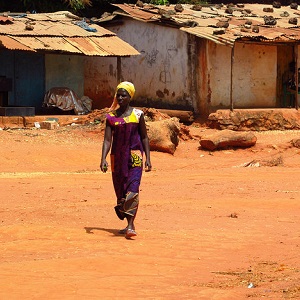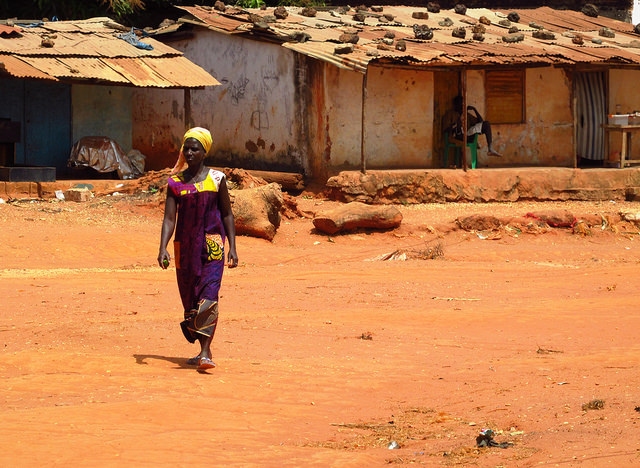Breaking the Ice in Guinea-Bissau
Women and Conflict Prevention in Africa.
Adriana Erthal Abdenur
Since attaining independence from Portugal, in 1973, Guinea-Bissau has had almost a dozen presidents, none of whom has managed to finish his mandate. Recurring coups, assassinations, and political turmoil at the elite level have contributed towards a landscape of instability, underdevelopment, and vulnerability to organized crime, especially the illegal drug trade. However, unlike some of its neighboring states, Guinea-Bissau has not relapsed into full-blown civil war in almost twenty years. Overcoming the present political impasse is thus necessary not only to prevent recurrence of armed conflict, but also to consolidate stability and lay the basis for a more sustaining and inclusive peace. Against this backdrop, women in Guinea-Bissau have made inroads in conflict prevention, helping to diffuse tensions around an impasse which Guinea-Bissau leaders have called “explosive.” To this end, they have created new ways of influencing political processes in Guinea-Bissau, drawing on task forces and network-building.
After the latest coup d’état, on 12 April 2012, the Economic Community of West African States (ECOWAS) led efforts to generate a roadmap towards peace, structured around six points for establishing an inclusive dialogue process and forming a consensus-based government to serve and implement reforms until the 2018 elections. ECOWAS hosted talks in Conakry, Guinea, between Bissau-Guinean political leaders, along with civil society and religious leaders, leading to the signing of the ten-point Conakry Accord, on 14 October 2016. The deal outlined in greater detail plans for implementing the roadmap. Nonetheless, the two sides have had divergent interpretations of key points in the agreements, creating challenges for the implementation of the points. One sign of the impasse was that President José Mário Vaz and politician Domingos Simões Pereira, who served as Prime Minister from 2014 to August 2015, when the president dismissed the government, had not spoken to each other in almost two years.
Breaking this ice became one of the stated objectives of the Group of Women Facilitators, which was created in May 2017. The Group–composed of 10 women from civil society organizations in Guinea-Bissau—began working to promote dialogue among the key stakeholders in the negotiations. Among other initiatives, the group facilitated meetings in late June and during July between several leaders. One meeting marked the first time that Vaz and Simões Pereira spoke to one another in two years. After months of intense work, the group prepared reports and considered to have attained “around 90%” of their goals, according to another member, Francisca Vaz, who stressed in an interview that its overarching goal was to “avoid violence” and allow people to “deal with their grievances, dialogue so as to put into practice” the wellbeing of the population.
The initiative has been lauded in New York by the current president of the Peacebuilding Commission Country-Specific Configuration for Guinea-Bissau, Brazilian Ambassador Mauro Vieira. Vieira underscored the usefulness of the group in building confidence, alleviating tensions, and opening up communication channels among the key actors.
Although full dialogue is yet to be resumed, the role of the women’s facilitator group may yet contribute towards a broader objective, one that is likewise relevant to conflict prevention: greater gender equality in Guinea-Bissau. As Suzi Barbosa–the leader of another important initiative, the Network of Parliamentary Women (Rede de Mulheres Parlamentares)–has recently noted, the crisis in Guinea-Bissau would not be quite as serious if there were more women in Parliament and in the Executive branch. Although women make up the majority of this country’s population, at an estimated 52%, they lag behind in political representation. This is particularly problematic because, when Guinea-Bissau underwent democratization over two decades ago, the number of women in Legislative and Executive was much higher, with 30 deputies. Now, there are only 14 women among 102 deputies. Only 10% of Parliament seats and government are held by women, and only one-quarter of all public administration jobs. In 2017, Guinea-Bissau has no women ministers, which means that there aren’t gender-sensitive policies being put into place—a gap that can contribute to the recurrence of violence as women are excluded from the political process.
The Network has been working with UNIOGBIS office in Bafatá to encourage more women to run for office and participate in politics, to work toward the implementation of gender quotas, and to include gender equality in school curricula.
Efforts by women’s groups, such as the Group of Women Facilitators’ work towards the implementation of the Conakry Agreement and the advocacy by the Network of Parliamentary Women for gender-sensitive policies may intensify in the next few months. The UN Secretary General’s Special Representative and head of the UN Integrated Peacebuilding Office in Guinea-Bissau (UNIOGBIS), Modibo Touré, has stated that the UN Security Council, along with representatives from the ECOWAS and the Community of Portuguese Language Countries (CPLP), should demand that President Vaz implement the agreement calendar by September 2017. He noted among recent advances not only efforts to combat the illegal drug trade, but also progress in women’s rights. Fully overcoming the political impasse and putting into gear the implementation of the Conakry Accord, however, is only one step towards resolving the differences that have led to recurring political instability and that have largely excluded the women of Guinea-Bissau from the country’s political process. Ensuring their meaningful participation, both in the agreement implementation and in the country’s broader political process, is an essential step towards more effective conflict prevention in Guinea-Bissau.




